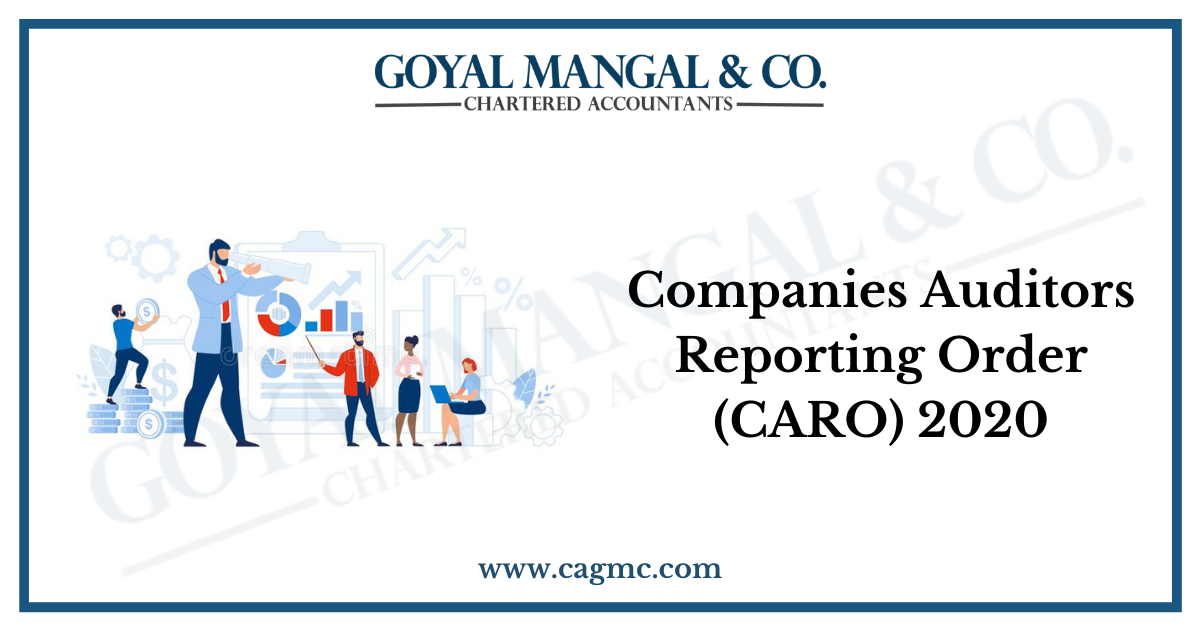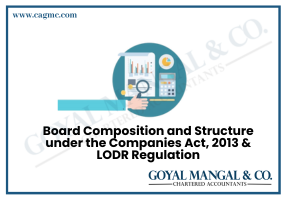| Table of Content |
Recent Amendments under CARO
Ministry of Corporate Affairs (MCA) has made certain changes in companies (auditor’s record) order vide its notification dated 25th February 2020, and has published Companies (Auditor’s Report) Order, 2020. It shall be applicable for the audit of financial statement 2019-20.
Companies covered under CARO 2020
It shall be applicable to every company including a foreign company as defined in clause (42) of section 2 of the Companies Act, 2013 except:
-
- A banking company as defined in clause (c) of section 5 of the Banking Regulation Act, 1949.
- An insurance company as defined under the Insurance Act, 1938.
- Section 8 companies as per the companies Act 2013.
- A One Person Company as defined in clause (62) of section 2 of the Companies Act 2013
- A small company as defined in clause (85) of section 2 of the Companies Act 2013.
- A private limited company, not being a subsidiary or holding company of a public company:
- Having a paid up capital and reserves and surplus not more than one crore rupees as on the balance sheet date.
- Should not having the total borrowings exceeding one crore rupees from any bank or financial institution at any point of time during the financial year.
- Total revenue as disclosed in Schedule III to the Companies Act (including revenue from discontinuing operations) should not exceeds ten crore rupees during the financial year as per the financial statement.
Matters to be included in auditor’s report
- The CARO, 2020 added some more clauses, as compared to CARO, 2016. There are in total 21 clauses in CARO 2020 as compared to 16 clauses in CARO 2016, 7 clauses inserted, 1 clause merged with other and 1 clause deleted.
- Instead of fixed asset in CARO 2016, CARO 2020 includes Ind AS 10 PPE.
- A specific format has been given for reporting the details of such immovable properties whose title deeds are not held in the name of the company.
- Disclosure of details of proceedings against the company for holding Benami Property(Property in the name of proxy) and whether the company has disclosed the details in its financial statements.
- Discrepancies noticed during physical verification of inventory would have to be reported by the auditor if such Discrepancies are of 10% or more in the aggregate of each class of inventory.
- If, the Company has been sanctioned working capital (cash credit) limits exceeds Rs.5 crores, in aggregate, from banks or financial institutions on the basis of security of current assets the auditor is required to provide specific details as to whether the quarterly returns/statements filed by the Company with such banks or financial institutions are in agreement with the books of account of the Company.
- In clause 3(iii) of CARO, 2020, the auditor required to check and report in detail on the investments made by the company, any guarantee or security provided or any loans or advances in the nature of loans granted, secured or unsecured, to companies, firms, Limited Liability Partnerships or any other parties during the year, should not prejudicial to the interests of the company.
- A specific format has given to report the period and the amount of default by the company in repayment of loans or other borrowings or in the payment of interest thereon to any lender.
- The auditor is required to render his opinion on the basis of the financial ratios, ageing and expected dates of realization of financial assets and payment of financial liabilities, other information accompanying the financial statements, the auditor’s knowledge of the Board of Directors and management plans, that no material uncertainty exists as on the date of the Audit Report that company is capable of meeting its liabilities existing at the date of balance sheet as and when they fall due within a period of one year from the balance sheet date.
- The number of cash losses incurred in the financial year and in the immediately preceding financial year has to be reported.
- The auditor has to take into consideration the issues, objections or concerns raised by the outgoing auditors before forming his opinion.
- The auditor is required to report about the company if it is a declared willful defaulter by any bank/ financial institution/other lenders.
- The auditor would have to report as to whether term loans were applied for the purpose for which the loans were obtained and if not, the amount of loan and the purpose for which it is used would have to be reported.
- The auditor is required to report as to whether any fraud by the company or any fraud on the Company has been noticed or reported during the year; If yes, nature and the amount involved is to be indicated.
- The auditor is to consider whistle-blower complaints received during the year by the Company in his audit.
- The auditor is to report if the company has conducted any Non-Banking Financial or Housing Finance activities without a valid Certificate of Registration (COR) from the Reserve Bank of India as per the RBI Act 1934.
- The auditor of the parent company is now required to indicate the details if the auditor of subsidiary companies gives any qualifications/adverse remark under CARO 2020 of the subsidiary companies and include such remark in the consolidated financial statements.
- The CARO, 2020 is expected to significantly improve the overall quality of reporting by the Auditors on the financial statements of the Companies and thereby lead to greater transparency and faith in the financial affairs of the companies. This is automatically expected to greater inflow of investment by and in Indian companies.
Comparison between CARO 2016 and CARO 2020:
| Clause | CARO 2016 | CARO 2020 |
| i. Non –current assets |
|
|
| ii. Inventory and other current assets |
|
|
| iii. Investments, loans or advances by company |
|
|
| iv. Loan to Directors and Investment by the Company |
|
No change |
| v. Deposits accepted by the company |
And if not, the nature of contraventions should be stated. |
No changes |
| vi. Maintenance of cost records |
|
No change |
| vii. Statutory dues |
|
No change |
| viii. Disclosure of undisclosed transactions | Not applicable |
|
| ix. Loans or other borrowings |
|
|
| x. Money raised by IPOs, FPOs |
|
|
| xi. Fraud |
|
|
| xii. Nidhi company |
|
No change |
| xiii. Related party transactions |
|
No change |
| xiv. Internal Audit System | Not applicable |
|
| xv. Non-cash transactions |
|
No change |
| xvi. RBI registration |
|
No change |
| xvii. Cash losses | Not applicable |
|
| xviii. Consideration of outgoing auditor | Not applicable |
|
| xix. Material uncertainty in relation to realisation of financial assets and payment of financial liabilities | Not applicable |
|
| xx. Compliance of CSR | Not applicable |
|
| xxi. Qualifications or adverse remarks in the consolidated financial statements | Not applicable |
|








